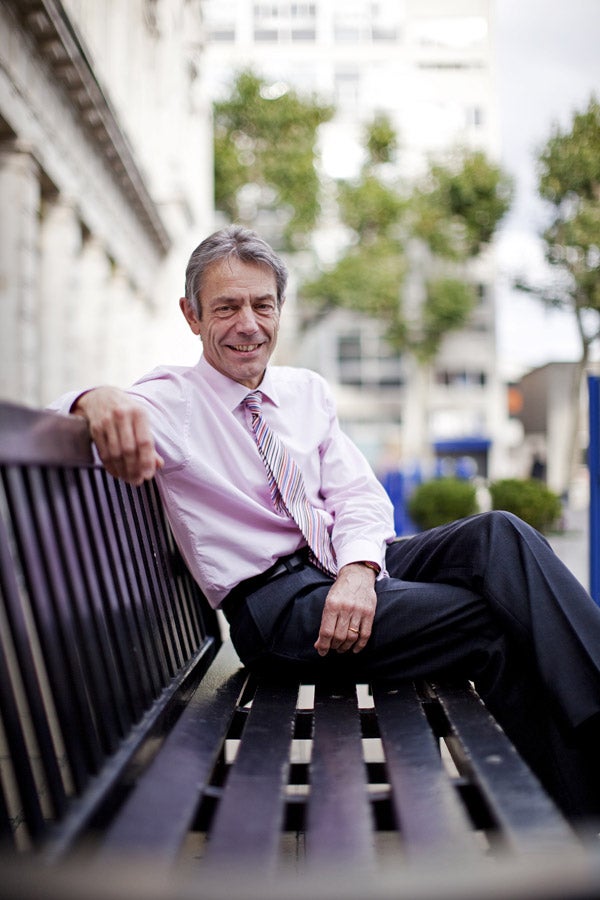Big ambitions: Queen Mary's new head sets targets to push college up the league tables

Simon Gaskell is in his fifth day of his new job at Queen Mary, University of London, the grittily urban institution in the melting pot of the East End. His room is full of empty boxes that he unpacked and brought from Manchester University where he was vice-president in charge of research. So, he looks as though he is in the camping-out stage of a new job.
Despite all that, he has been thinking hard about what Queen Mary needs and has come up with ideas that he intends to put into effect as quickly as decently possible in the slow-moving higher education universe.
Queen Mary, once described as at the arse-end of the University of London, has been zooming up the domestic research league table – up from 45th to 11th in the last Research Assessment Exercise – and Professor Gaskell wants to consolidate its position.
The institution was turned round by the charismatic former principal Professor Adrian Smith, now the Government's director general of science and research, who sorted its finances and gave it a new self-confidence. And he managed this without setting goals. Professor Gaskell, however, is determined to give it some hard numerical targets to meet.
"There's a clear recognition within higher education that Queen Mary is an institution that has achieved a lot but we need to keep it on an upward trajectory," he says. "In our strategic plan we will be setting out clear and quantifiable objectives for further enhancing our position."
He points out that five years ago the newly merged University of Manchester, whence he hails, committed itself to be in the top 25 in the world in the Shanghai league table by 2015. "This is the sort of objective we will set," he says. "We will be saying that we want to be in a certain top group of research-led universities nationally."
Manchester has risen from 53rd position in 2005 to 50th the following year, to 48th the year after, and finally to 40th place in 2008. So, he says, league tables work in setting benchmarks for institutions and making them ambitious.
Gaskell won't be drawn on where he wants Queen Mary to be, but he is not talking international league tables – not yet, at any rate – though he is quite clear that league tables are a good idea, contrary to what their critics believe. "It's really important that these objectives are very specific," he says. "That is what achieves impact."
There is no point in simply opining that Queen Mary is or should be a world-class university, he thinks. The phrases "world class" and "internationally competitive" are bandied about by universities all the time, but they are either grossly misleading or mean almost nothing.
"What is fully meaningful is to say, 'We will judge ourselves and allow others to judge us by whether we achieve these objectives.' In 2015, anyone can look at those objectives and see if they have been met."
Asked with which American universities Queen Mary should be comparing itself, he mentions the best state universities: University of North Carolina at Chapel Hill, Michigan, Wisconsin, Berkeley and UCLA."The reason I point to state universities is that we have a very clear public commitment," he says. This is a reference to Queen Mary's historical role serving the people of the East End from its headquarters in Mile End Road.
Although Gaskell has no plans to recruit Nobel prize-winners as Manchester did to reach a new target, he is hoping to recruit "very high profile and successful" academics because of their extra magnet effect. Quentin Skinner, a former regius professor of history at Cambridge, had this effect when he arrived at Queen Mary in 2008.
"We will recruit academics who will be iconic with respect to their profile and their ability to attract colleagues and students," he says.
The new principal is not coming in all guns blazing like a captain of industry wanting to make changes fast while he has the political capital. But there is an appetite for change, he says. He has made clear there will be a new strategic plan to be developed over the next few weeks and months, which will be launched in 2010.
Academics will be consulted and their views taken into account. But Gaskell means business and is determined to make Queen Mary into a significant player.
The CV: Simon Gaskell
Age: 59
Education: Haberdashers' Aske's School, Estree, Herts; BSc and PhD in chemistry at the University of Bristol
Careers: Postdoc at Glasgow University; research in mass spectrometry at University of Wales College of Medicine, Cardiff, and in the US; moved to UMIST in 1993, became head of the chemistry department; vice-president of research, University of Manchester, 2006-09
Likes: The Doors, Jefferson Airplane, Katie Melua, rugby
Dislikes: Oysters and caviar
Bedtime reading: The Assassin's Cloak, an Anthology of the World's Greatest Diarists, edited by Irene and Alan Taylor.
Family: wife is an educational psychologist; grown-up son and daughter living and working in London
Join our commenting forum
Join thought-provoking conversations, follow other Independent readers and see their replies
Comments
Bookmark popover
Removed from bookmarks